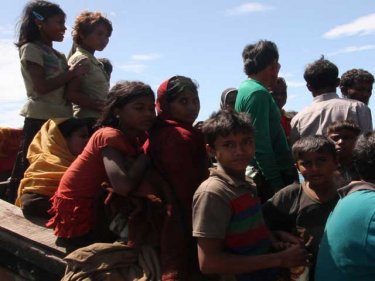PHUKET: Governments from across the Asia-Pacific region are meeting in Bangkok today to discuss irregular migration in the Indian Ocean as the ''sailing season'' begins with the end of monsoon rains and calmer seas.
The numbers putting out to sea are lower than last year, when boatloads of migrants - at sea for weeks without proper supplies of food or water - were a daily feature in the news headlines.
About 1,000 people have set sail since September, markedly fewer than the 25,000 crammed into flimsy, ill-equipped boats in the same period a year ago.
On the eve of the two-day International Conference on Irregular Migration, IOM Director General William Lacy Swing, called on all parties - governments, aid organisations, law enforcement agencies and local communities - to do their utmost to tackle the problem before it becomes a crisis.
''What we need more than anything else is regional cooperation and follow-up on the outcomes of previous meetings, including standard regional procedures for search and rescue; prompt and humane disembarkation; proper shelter and other humanitarian assistance,'' said Ambassador Swing.
''We also need better law enforcement and counter-trafficking work, a regional information campaign, and the establishment of task forces to focus on these issues in all affected countries.''
The Bangkok conference is expected to propose a regional task force to tackle smugglers and reduce irregular movements.
''We stand ready to assist in whatever way, although we would prefer that any migration in the Indian Ocean would be voluntary and well managed,'' the IOM Director General added.
Although there are no indications yet as to eventual flows, IOM expects to see a mixed flow of migrants, as in previous years, some from Bangladesh seeking job opportunities in Malaysia, and people from Northern Myanmar, trying to escape poverty and harsh living conditions.
A crackdown by Thai authorities earlier this year broke up a huge and well-organised network of people smugglers who were operating on the Thai-Malaysian border.
The smugglers were holding migrants in camps until ransoms were paid, and torture, rape and murder appear to have been widespread.
In the absence of a route through Thailand, following the Thai crackdown, the smugglers are now bringing their human cargo directly to Malaysia.
The numbers putting out to sea are lower than last year, when boatloads of migrants - at sea for weeks without proper supplies of food or water - were a daily feature in the news headlines.
About 1,000 people have set sail since September, markedly fewer than the 25,000 crammed into flimsy, ill-equipped boats in the same period a year ago.
On the eve of the two-day International Conference on Irregular Migration, IOM Director General William Lacy Swing, called on all parties - governments, aid organisations, law enforcement agencies and local communities - to do their utmost to tackle the problem before it becomes a crisis.
''What we need more than anything else is regional cooperation and follow-up on the outcomes of previous meetings, including standard regional procedures for search and rescue; prompt and humane disembarkation; proper shelter and other humanitarian assistance,'' said Ambassador Swing.
''We also need better law enforcement and counter-trafficking work, a regional information campaign, and the establishment of task forces to focus on these issues in all affected countries.''
The Bangkok conference is expected to propose a regional task force to tackle smugglers and reduce irregular movements.
''We stand ready to assist in whatever way, although we would prefer that any migration in the Indian Ocean would be voluntary and well managed,'' the IOM Director General added.
Although there are no indications yet as to eventual flows, IOM expects to see a mixed flow of migrants, as in previous years, some from Bangladesh seeking job opportunities in Malaysia, and people from Northern Myanmar, trying to escape poverty and harsh living conditions.
A crackdown by Thai authorities earlier this year broke up a huge and well-organised network of people smugglers who were operating on the Thai-Malaysian border.
The smugglers were holding migrants in camps until ransoms were paid, and torture, rape and murder appear to have been widespread.
In the absence of a route through Thailand, following the Thai crackdown, the smugglers are now bringing their human cargo directly to Malaysia.




